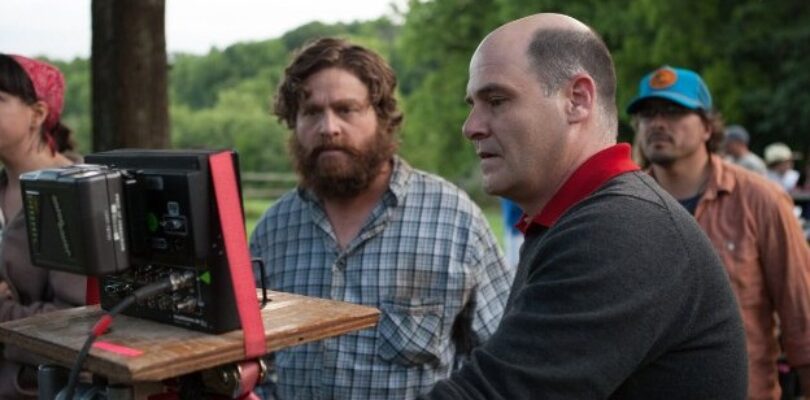The new film Are You Here follows Steve Dallas (Owen Wilson), a womanizing weatherman, and his slightly off best friend, Ben Baker (Zach Galifianakis), as they return to Ben’s childhood home after his estranged father passes away. Upon learning that Ben has inherited a majority of the family fortune, the two friends must deal not only with the strain these events are having on their friendship, but with Ben’s controlling and bitter sister (Amy Poehler), Ben’s father’s beautiful young widow (Laura Ramsey), and each of their own shortcomings as they try to straighten out and take control of their lives
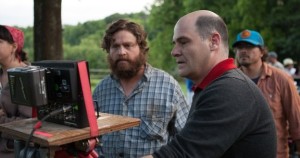
Zach Galifianakis and Matthew Weiner on the set of “Are You Here.” Photo by James Bridges – © You Are Here Films, LLC
The film’s writer and director, Matthew Weiner, whom most may know as the creator of one of television’s most acclaimed dramas, Mad Men, brings his unique style of storytelling to Are You Here, his feature film debut. Weiner began working on the script while working on The Sopranos. Once the script was finished, it took Weiner nearly eight years to get it in Wilson’s hands – the only actor Weiner had seen in the role of Steve from the beginning.
Weiner recently spoke with CinemaNerdz about Are You Here. The conversation included the existential nature of the film, the Amish, the cinema of the early 1970s, as well as the unexpected dramatic turns taken by the film’s traditionally comic stars: Owen Wilson, Zach Galifianakis, and Amy Poehler. What follows is a transcript of that discussion.
[divider]
CinemaNerdz: How did the idea for Are You Here come about?
MATTHEW WEINER: This is a story that sort of came to me derived from experiences in my life. I noticed that with the success of my marriage and my family, the people who were very important to me at a certain point in my life were not part of my life anymore; and that was my male friends. It was something that you see in TV and in movies and you realize it’s some kind of wish fulfillment to have that closeness. But I didn’t understand what happened to it or what it was about. Was it the idea that we had just moved on in our lives and that those people were just there for a certain part of your life? Because it was very meaningful to me, that’s where I started with the idea and then it starts to become another thing, like all ideas.
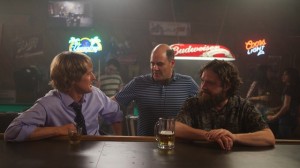
Owen Wilson, Matthew Weiner, and Zach Galifianakis on the set of “Are You Here.” Photo by JAMES BRIDGES – © You Are Here Films, LLC.
I’m a big fan of movies from the early 1970s. I love Hal Ashby. I love Five Easy Pieces (1970). I love the style of the filmmaking then that was really about the human experience and not narratively predictable, and the way real life was. So I set out to sort of tell the story seen through the guise of two characters that are probably deeply influenced by the movies, to the point where they think they are living in a stoner comedy. I even used the personas of Owen [Wilson] and Zach [Galifianakis] from their other projects. Then sort of have it turn into something else in that you have two men in their early forties who are not really moving on with their lives that have actual serious problems. Owen’s character’s being that he has a drug problem and Zach’s character’s issue is that he is mentally ill. So the idea of having the movie transform into something else, I’d say well what’s underlying that condition? How does a person survive like that? And finally saying how important it was that they had this friendship – that the friendship was the real part of it. There are compromises to growing up and there are compromises in adulthood, whether it is the loss of innocence or the loss of the free-wheeling irresponsible person you used to be. But we’re lucky to be here.
That’s really the story I wanted to tell. I really wanted to not have this formula. I’m so less than entertained frequently by the predictability of story. I know some of it’s comfortable for people and they get reaffirmed and they are guided through; just as anyone who has kids knows that there’s something amazing about telling them a story that they’ve already heard. That they can sit back and pay attention to the details. But I love a story, among other kinds of stories; I love a story where I don’t know what’s going to happen.
[pullquote_left]It plays with the audience’s expectations of the movie formula.[/pullquote_left]
CinemaNerdz: That definitely shows in this movie. I kept waiting for certain points to hit and they never hit. That was refreshing and I totally agree with you.
WEINER: It plays with the audience’s expectations of the movie formula.
CinemaNerdz: Exactly.
WEINER: For the wedding at the end or whatever you think is going to be there. I think that the highest complements I’ve had about the movie are related to the fact that people know these people. Four very flawed characters. And you do find out that there’s something wrong with everyone, as you do in real life. I don’t like to judge characters, so the challenge is to say I’m not just leaving you with the observation, I’m going to leave you with the idea that there’s so much value. That’s why it’s called Are You Here; it’s the idea of being in the moment even for a second, and appreciating that.
CinemaNerdz: To get back on relationships and Steve and Ben, would you consider this story either Steve or Ben’s in particular or this just a movie about relationships?

Owen Wilson and Zach Galifianakisin “Are You Here.” Photo by James Bridges – © You Are Here Films, LLC.
WEINER: It is about relationships. It is a two-hander, especially when we saw Owen’s character as the main character and he’s…a little bit diluted, and I think the audience frequently sees things through his eyes and feels a little bit betrayed because he doesn’t rise to the occasion. I love the dynamic of saying okay these guys are peanut butter and jelly. They go together great. But the fact is that they both have real problems, and that maybe their friendship is the good part of it. But when you find out that Steve actually has a drug problem and that Ben is actually mentally ill and that there are larger repercussions to that, the idea is can you get them to switch places. Can you get them to change? That’s part of what I think attracted the actors to the parts, was playing someone who actually changes.
CinemaNerdz: I know that you’ve said in previous interviews that Owen Wilson was someone you wanted to play Steve from the beginning. Can you talk a little bit about that?
WEINER: I’ve always been a fan of Owen’s. I love the idea of playing with his persona. To me, like Bill Murray, we think we know who [Owen] is because he has played these sort of glib characters, and you don’t get that mad at them even though they’re kind of selfish and frequently dishonest and childlike. But what is underneath that and what would happen if that character was forced to face a real problem? What are they made of? There is virtue in that character because he is a friend. And that’s what attracted me to Owen, and hopefully something that will attract people to the movie, is that you’re getting a chance to see Owen and Zach and Amy [Poehler] play drama by the end of the movie that I don’t think a lot of people know that they can do. They’re such three-dimensional actors, it was very exciting.
CinemaNerdz: Speaking to the cast, how close did the rest of the cast come to what you envisioned for those characters?
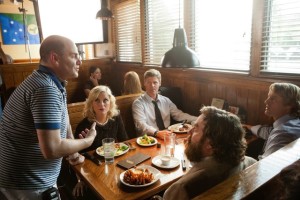
Matthew Weiner, Amy Poehler, Joel Gretsch, Owen Wilson, and Zach Galifianakis on the set of “Are You Here.” Photo by James Bridges – © You Are Here Films, LLC.
WEINER: They completely exceeded it. That’s what you hope for. Honestly, it’s one thing to see it on paper and some of the way that the dialogue is done is a little elevated. They’re more eloquent than regular people. And you want to see them handle the dialogue and turn [the characters] into three-dimensional people. I’m just there as a director to be the best audience I can be. It was so believable to me, that I knew them, I knew the characters. They’re such finely tuned instruments. I use Amy as the example, but she could play that person so much more broadly and probably get more laughs but the restraint required to turn [the character] into a real person and to basically say, okay you’re the adult in this situation, but you’ve had it and you have been through this before, and you are going to play this as a real person because everybody has a reason for what they are doing. By the end of the movie you realize then that you have four very flawed people and hopefully you get a chance to look in the mirror a little bit, but you also get a chance to feel less alone about those qualities.
CinemaNerdz: Like you said, that’s real life.
WEINER: Right. I don’t even know if it’s in style to tell stories like this, but I love stories like this.
CinemaNerdz: You mentioned directing these actors, I was wondering, were there any difficulties transitioning to feature film directing as opposed to television directing and Mad Men?
WEINER: Well, for one thing, it was actually less luxurious than the TV show because we were already finished with the fifth season of the show and we have our sets and we all know each other and then you walk into a situation for a real independent movie with a limited schedule and a limited budget and you’re on locations. Ninety-five percent of the movie is shot in locations, so there’s less control. And you’re dealing with movie stars. So there is a trust factor, you have to sort of start over as opposed to on a TV show. I’m not saying it’s not a two-way street, it’s like figuring each other out and everything, my cast on the show was a very different experience than someone who’s made a lot more movies than I have.
[springboard type=”video” id=”980001″ player=”cnim002″ width=”630″ height=”315″ ]
CinemaNerdz: I did want to ask, was there a personal meaning behind the use of the Amish community in the film beyond just the spiritual, narrative device that it was?
WEINER: Yes, there is. Because I, like most of America, have a fascination with the Amish. Part of it was imagining these guys growing up in that world. And Zach’s character’s idealization of them as being close to nature and virtuous and then the other half of it is that they are a religious group that is fanatical and extreme. Maybe there are moments of intolerance in there. There’s all the reality of what that is. But we’re on the outside of it and I loved it as a fixation for the character, for Zach’s character, because I think it’s easy if you are looking for virtue to say from the outside that that’s the way to live. I think a lot of what the Amish stand for is very beautiful, but I also think that for Ben, his interest in them is somewhat unfounded. The spiritual aspect of the movie was something that sort of snuck up on me. I guess when you ask a question like “If we stop living the way we live, what else is there?” you’re basically asking a pretty bleak question and the title of the movie, Are You Here, and the climax of the movie is about gratitude and about being closer to nature and about being a better human being just by acknowledging a) that life is difficult and b) that other people can be a gift.
CinemaNerdz: Sort of existential.
WEINER: I think that, in the end, I will take the risk and say that is exactly what I was trying to do.
CinemaNerdz: That’s an excellent risk to take.
WEINER: The movie is not Mad Men but it does share that in common that I am interested in the difficulty of being a human being. And I try not to judge my characters because I want the audience to not feel alone if they’re willing to admit that they have these issues.
[pullquote_right]I am interested in the difficulty of being a human being.[/pullquote_right]
CinemaNerdz: After making the film, have you come to any conclusions regarding the exploration of relationships that you began in the film?
WEINER: I think that the spiritual part of it was the insight that I gained. I think it was on my mind and that it was in my subconscious when I was making the film, but when I watch the film, especially with an audience, I realize that there is at least an attempt to deal with a pretty profound issue which is that ignoring all of your problems and anesthetizing yourself and distancing yourself from the realities of the world is, in the end, not a great way to live. Telling a story where the character is transformed by killing his own dinner, and placing yourself in that place and saying could I do that, would I be that honest, made me feel like that was a story worth telling. Then getting to the end of the movie and saying that it’s a compromise to be an adult but we’re so lucky to be here; any time you can tell yourself that, forget about other people, in an earned way that is not where the sentiment is not sentimental, you’ve gone through the experience of seeing these people lose a lot of things. That’s your dream; that it would sink in.
CinemaNerdz: Do you have a favorite scene or moment from the movie or filming?
WEINER: I do. My favorite scene, and it’s not just because one of my kids is in it, is the scene where the Amish boy tells Zach’s character to take his medicine. It was sort of a cross section of a solution to a very serious problem, which is Zach’s character’s mental illness, and it comes from a child and it’s a crazy solution. But it feels very meaningful because they’re speaking the same language. Even though neither of them is rooted in reality in that moment, it has a greater meaning to me. It gets me very emotional to think of just another human being reaching out like that.
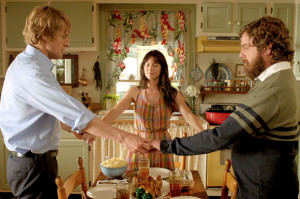
Owen Wilson, Zach Galifianakis, and Laura Ramsey in “Are You Here.” Photo by James Bridges – © You Are Here Films, LLC.
CinemaNerdz: And it’s like a microcosm of all the themes you mentioned throughout the movie.
WEINER: And at the same time, completely unreal. It’s like, really? From a story point of view, I was like how can I get him to take his medicine? That’s what part of the story is, is that he is going to relent when he realizes that he actually has a problem. That his mental illness is an issue and that he can’t go on living that way, how do you get him reverse everything that he’s said the entire movie about not wanting to be a regular person and how great he feels and the genius that comes along with this bipolar condition, the energy? How do you get him to reverse that? I love the idea that someone that probably has the same problem talks him into it and it’s only the two of them thinking that that is real that solves the problem. It has a lot of truth for me. I can’t even put it into words actually.
CinemaNerdz: It was an excellent turning point scene. I was going to mention that one as my favorite as well.
WEINER: Oh cool.
CinemaNerdz: So, what’s next for you?
WEINER: What’s next for me is that I’m still finishing post production on the show. Right now I feel very grateful that we haven’t aired everything yet and that I get to go through actually putting the end of the show on the air next year. During that time I’m actually going to rest a little bit and go back to my true day job which is eavesdropping and daydreaming. I’ve been very lucky to express a lot of ideas both in this film and in the ninety-two hours of Mad Men, and it’s time for me to see what else is on my mind.
[divider]
Are You Here is in theater and On Demand on August 22nd, 2014!

